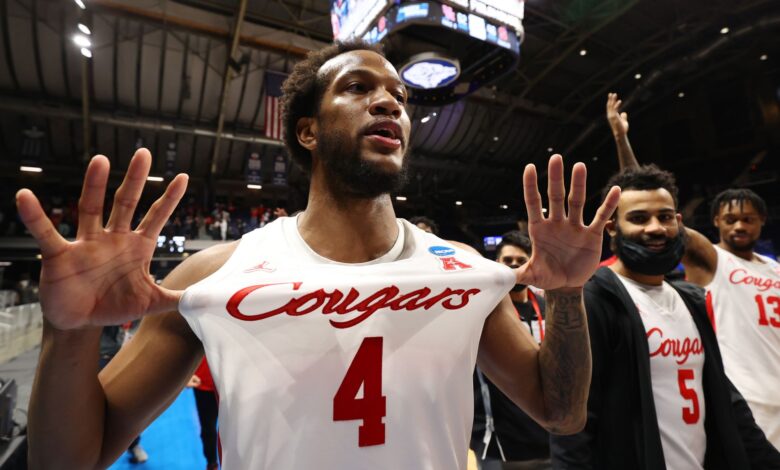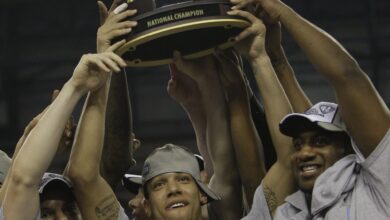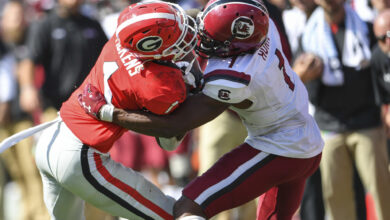Change is coming to college basketball

[ad_1]
INDIANAPOLIS – This entire NCAA tournament has doubled as a time warp. The games end, and the digital pages flip back to find distant precedents and snapshots of bygone eras.
With seemingly every team that advances, there’s a corresponding stroll through the past. The final DeLorean spin came at historic Hinkle Fieldhouse when No. 2 Houston smothered Syracuse with a rugged man-to-man defense in a 62-46 win.
That marked Houston’s first trip to the Elite Eight since 1984, with Kelvin Sampson’s team reviving the ghosts of Phi Slama Jama. “How many years is that?” Sampson said, before learning it was 37 years. “Just think of all the people that have come and gone since then.”
Those kinds of throwbacks came from every corner of Indianapolis on Saturday. For No. 12 Oregon State, it marked the program’s first Elite Eight since 1982. No. 1 Baylor is one win away from the program’s first Final Four since 1950. No. 3 Arkansas is reviving the Clinton years, storming to its first Elite Eight since 1995.
All these trips back are also offering us a glimpse of the future. Both the near future and the long-term future of the sport are going to continue to be littered with firsts, breakthroughs and consistent inconsistency. Consider that none of the head coaches of the 12 remaining teams in Indianapolis has won a national title.
Surely, the blue bloods aren’t going to disappear from the landscape. But when half of the Elite Eight is Houston, Baylor, Oregon State and Arkansas, it’s a sign that new blood is going to be transfused into the sport’s top echelon more frequently.
Welcome to the era of the transfer, elite talent choosing the G League and a few more seasons of uncertainty with the federal investigation hanging over the sport. Chaos will be normalized, talent will be more diversely dispersed and the difference between double-digit seeds and the corresponding teams appearing across the bracket will continue to shrink.
If you need further proof, just look at Sunday. The sport is staring at the precipice of history again.
Top-seeded Gonzaga is heavily favored for the first title in school history. Then there’s Florida State, which could make its first Final Four since 1992. Alabama is aiming for its first-ever Final Four. USC hasn’t been to a Final Four since 1954, which is long enough ago that it’s pre-Pac-8. There are all kinds of storylines, just not from the places we’re accustomed to telling them.
There’s myriad reasons to pinpoint for this influx of new faces, places and historical markers. The specter of the federal court has diluted places like Kansas, Louisville and Arizona that have been familiar faces on this weekend of the tournament for the past two decades. (Those actual decisions on the cases appear on track to emerge around the time when Jim Boeheim’s grandson is playing for the Orange.)
It’s telling of the times that Houston’s best player, Quentin Grimes, came from Kansas. Arkansas got 11 offensive rebounds from Indiana transfer Justin Smith and 22 points from Northern Kentucky transfer Jalen Tate. Baylor’s Davion Mitchell popped over from Auburn and MaCio Teague came from UNC-Asheville. Oregon State’s second-best player on Saturday, Warith Alatishe, came from Nicholls State.
The transfers will come up, down, laterally and in all directions. The only thing certain is that they’re going to keep coming — nearly 1,000 in the portal as we type. Whether you want to embrace it or judge it, get used to it. The ripples of college basketball free agency are just beginning.
Two more huge rule changes are imminent — the long-overdue ability for athletes to profit off their Name, Image and Likeness, and the inevitable passing of the one-time transfer exemption. The sport is a giant snow globe, re-shaken every year to form a distinctly different landscape.
Top talent isn’t going to stop heading to Duke, Kentucky and Louisville. But the questions lie whether there will be a shift in recruiting priorities away from high school players and a focus on college veterans. Today was further proof that this is a tournament for the rugged and developed, not the precocious with potential.
Is this good for the sport? Is it bad? That’ll be the podcast-dominant storyline of the offseason. No one can argue that it’s the reality. Constant change, dynamic change and historic change are the new normal in college basketball.
And there will be no greater symbol of that than all the title winners watching from home tomorrow. New blood is pumping fast, and it’s not slowing.
More from Yahoo Sports:
[ad_2]
Source link






